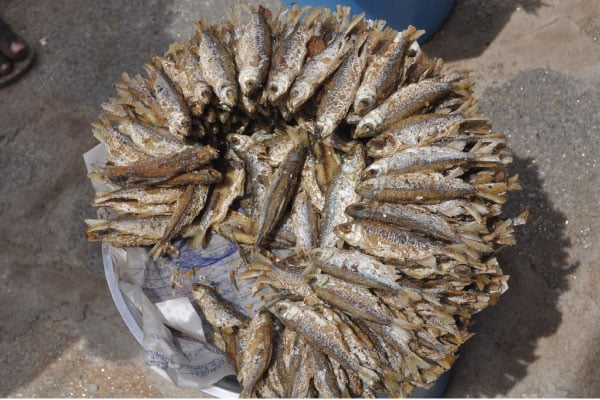Prime
Nang-nang fish puts more money in the pocket

Nang-nang fish. PHOTO/FILE
At an unusually sharp road bend at the edge of Pakwach Town and a few metres from Pakwach Bridge, a traffic police officer and three other soldiers at the roadblock are checking a truck seemingly destined for Panyemur market.
My attention was immediately drawn to the crowd convened by the occupants of the truck by the roadside who did not bother what the security men were doing.
As I approached the crowd, two young men squeezed themselves out of the crowd holding in their hands what at first looked like tiny fingerlings with a blend of a remarkable golden and silverfish colour carefully wrapped in transparent kaveera.
While I wondered how each of the men kept gulping their bites one after the other, this time, a woman who looked to be in her 40’s dressed in a worn-out kitenge approached with a tray packed with the fish.
“They are small in size but matured already, it is a ready-to-eat crunchy snack commonly called nang-nang (African tigerfish). It is probably tastier than those nsenene (grasshoppers) of yours in Kampala, kindly buy some,” said the woman who later identified herself as Grace Uweci.
So, as I enjoyed the fish on my last trip to Pakwach District last week, I further wondered if at all many Ugandans have ever tasted this delicacy.
The fried fish, a delicacy among the Alur is a trademark of the Alur people due to its abundance in market centres, bus stops, in hotels and on many streets where it is served on the move.
For an average single woman such as Uweci, the desire and zeal it takes to provide for her children at times defy all logic, and personal safety.
That is why 13 years ago, the single mother of five, with a desire to provide for her children, invested in keeping and selling nang-nang in Pakwach Town.
Preparation
Nang-nang fish is only found along the White Nile possibly because it is less saline than the Victoria Nile. Albert Nile, also called Mobutu Nile, is the upper Nile River in north-western Uganda.
Ingredients will include the African tigerfish itself, simsim butter, onions, cooking oil and garlic.
The fish is sorted according to sizes and washed thoroughly to remove dirt and sand particles as onions and garlic boils in the hot concoction of cooking oil and simsim butter.
Upon sorting, they are then dipped in the boiling oil where it is deep-fried until its colour turns from silver-grey to golden brown, about 10 to 15 minutes after which it is allowed to cool for consumption.
Lucrative deal
According to Uweci, the silver-grey looking fish species is sold in a fried, ready to eat form and has increasingly become a popular takeaway for travellers and town dwellers.
“We buy the fish from the fishermen at the local land sites by the Nile river opposite Pakwach main bridge and process them for sale,” she said.
While five or six pieces of the fish cost the vendors Shs500 while buying from the fishermen, Uweci said the same quantity fetches Shs1,000 upon processing and cooking.
“After we buy them, we fry them in a concoction of boiled simsim butter spiced with salt, onions and other recipes to build the complete taste and aroma,” she stated.
While on the streets of Pakwach Town, Uweci says that the quantity one sells depends on how sharp and quick they are.
“Women, boys and girls alike, you have to run at vehicles to catch up with a customer as fast as possible. At times I sell a full basin that fetches me more than Shs40,000 while on a bad day when the fishermen have not harvested much, I can make about Shs25,000.”
Vision
Despite the challenges, Uweci last year bought an acre of land near Pakwach Secondary School where she put up a home for her family.
On the land she bought, Uweci says in a year’s time, she will begin building a six-room rental which she says will supplement greatly what she gets from the business.
“While my two elder daughters are on holidays, they supplement the labour force I need to maximizse my sales. I have bought for them trays and buckets to sell theirs also, through that, each of them make their school fees and pocket money,” she added.




